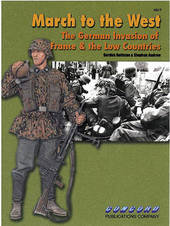
|
6517 March to the West: The German Invasion of France & the Low Countries
Paperback
Main Details
| Title |
6517 March to the West: The German Invasion of France & the Low Countries
|
| Authors and Contributors |
By (author) Gordon Rottman
|
|
By (author) Stephen Andrew
|
| Physical Properties |
| Format:Paperback | | Pages:52 | | Dimensions(mm): Height 296,Width 210 |
|
| Category/Genre | Second world war
Carving and modelling, moulding and casting |
|---|
| ISBN/Barcode |
9789623611336
|
| Audience | | Tertiary Education (US: College) | |
|---|
| Illustrations |
137 photos, 4 colour plates
|
|
Publishing Details |
| Publisher |
Concord Publications Co ,Hong Kong
|
| Imprint |
Concord Publications Co ,Hong Kong
|
| Publication Date |
15 March 2007 |
| Publication Country |
Hong Kong
|
Description
The newest addition to Concord's Warrior series is this title from Gordon Rottman. The accomplished author examines the typical German soldier as he appeared as Blitzkrieg was unleashed upon an under-prepared and overconfident Western Europe. The coverage extends from the abrupt end of the British-labeled Phony War (or Sitting War [Sitzkrieg] as the Germans called it) through to the victory parades in France after the successful conclusion of the campaign. The much-vaunted French Army had 78 divisions and 2,235 tanks, this latter figure being more than Germany itself possessed. Hitler launched his attack, codenamed Case Yellow (Fall Gelb), in the early hours of 10 May 1940. By the 17th, Brussels had fallen, and by the 19th discussions were already beginning about the possibility of withdrawing the British Expeditionary Force (BEF) from France. German troops entered Paris on 14 June, with an armistice surrendering France finally being signed on 22 June. This stunning and swift victory did not come cheaply, though, with Germany suffering 27,000 dead, 18,000 missing, and 111,000 wounded. This volume shows the triumphant German soldier as he is engaged in this campaign in the West. The black and white photos reveal interesting details about uniforms, weapons, equipment, and in some cases, even vehicles. The photos each receive informative captions that provide useful background details. Another feature is the four color plates by Stephen Andrew. These portray various types of soldiers with helpful notes about their uniforms and weapons. This is a handy volume and will be especially useful to modelers or military historians wanting to see German soldiers in action in the early-war period. The combination of photos, illustrations and photos provide a valuable introduction to this interesting but often neglected period of WWII.
|